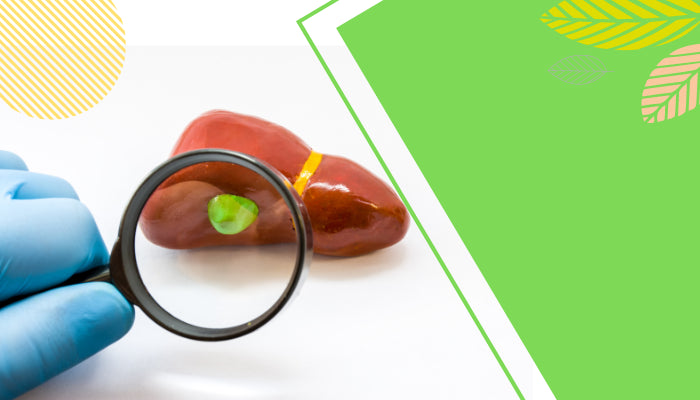Your Cart is Empty

লিভার ডিজিজ একটি সাধারণ শব্দ যা আপনার লিভারকে প্রভাবিত করে এমন কোনো অবস্থাকে বোঝায়। এই অবস্থাগুলি বিভিন্ন কারণে বিকশিত হতে পারে, তবে এগুলি সবই আপনার লিভারের ক্ষতি করতে পারে এবং এর কার্যকারিতাকে প্রভাবিত করতে পারে।
লিভারের রোগ নিরাময় হবে কি হবে না তা নির্ভর করে রোগের ধরন ও পর্যায়ের উপর। কিছু যকৃতের রোগ সঠিক চিকিৎসার মাধ্যমে নিরাময় করা যেতে পারে, এবং কিছু পরিবর্তনশীল জীবনধারা, কঠোর খাদ্যাভ্যাস অনুসরণ এবং উপযুক্ত ওষুধ গ্রহণের মাধ্যমে কমিয়ে আনা যায়।
লিভার শরীরের সবচেয়ে বড় শক্ত অঙ্গ। এটি উপরের দিকে অবস্থিত একটি মূলা বাদামী রঙের অঙ্গ পেটের ডান অংশ (পেট)।
বিভিন্ন কারণে লিভারের রোগ হতে পারে। কিছু কারণ উল্লেখযোগ্য, ভাইরাল সংক্রমণ: পরজীবী এবং ভাইরাস লিভার (হেপাটাইটিস) সংক্রমিত করতে পারে, যার ফলে প্রদাহ হয় লিভারের কার্যকারিতা হ্রাস করে। হেপাটাইটিস ভাইরাসের 5টি প্রধান স্ট্রেন রয়েছে, যাকে টাইপ A, B, C, D এবং E বলা হয়।
ইমিউন সিস্টেম আক্রমণ: একটি অটোইমিউন লিভার রোগের ফলে ইমিউন সিস্টেম লিভারের কোষকে আক্রমণ করে। আপনার লিভারের উপর এই আক্রমণ দীর্ঘস্থায়ী প্রদাহ এবং লিভার কোষের গুরুতর ক্ষতি হতে পারে। 3টি সবচেয়ে সাধারণ অটোইমিউন লিভার রোগ হল,
জেনেটিক্স/উত্তরাধিকারসূত্রে প্রাপ্ত লিভারের রোগ: আপনার পিতামাতার একজন বা উভয়ের কাছ থেকে উত্তরাধিকারসূত্রে প্রাপ্ত একটি অস্বাভাবিক জিন আপনার লিভারে বিভিন্ন পদার্থ তৈরি করতে পারে, যার ফলে লিভারের ক্ষতি হতে পারে। জেনেটিক লিভার রোগের মধ্যে রয়েছে:
ক্যান্সার: যকৃতের কোষ অস্বাভাবিকভাবে বৃদ্ধি পেলে লিভার ক্যান্সার শুরু হয়। উদাহরণ অন্তর্ভুক্ত:
টক্সিন ফুড: খাবারের কিছু টক্সিন লিভারের রোগের জন্যও দায়ী, যেমন চর্বি, অ্যালকোহল এবং অত্যধিক পরিশোধিত চিনি, সোডা, পেস্ট্রি, ক্যান্ডি এবং উচ্চ-ফ্রুক্টোজ কর্ন সিরাপ। অক্সিডেটিভ স্ট্রেস: অক্সিডেটিভ স্ট্রেস হল আমাদের শরীরে ফ্রি র্যাডিকেল এবং অ্যান্টিঅক্সিডেন্টের মধ্যে ভারসাম্যহীনতা যেখানে অ্যান্টিঅক্সিডেন্টের সংখ্যা ফ্রি র্যাডিক্যালের তুলনায় কম, অতিরিক্ত ফ্রি র্যাডিক্যালগুলি বড় চেইন তৈরি করে এবং বিভিন্ন ধরনের প্রতিক্রিয়া সৃষ্টি করে যাকে অক্সিডেশন বলা হয়। মধ্যে অক্সিডেটিভ চাপ মাইটোকন্ড্রিয়া লিভারে একটি প্রদাহজনক প্রক্রিয়ার সাথেও যুক্ত। এর অনুপযুক্ত বিপাক ROS ( প্রতিক্রিয়াশীল অক্সিজেন প্রজাতি) এর ফলে হাইপোক্সিয়া-ইন্ডুসিবল ফ্যাক্টর-1 আলফা প্রকাশ পায়, যা টিএনএফ (টিউমার ন্যাক্রোসিস ফ্যাক্টর) নিঃসরণ বাড়ায়, যার ফলে রোগ প্রতিরোধ ক্ষমতা বৃদ্ধি পায় লিভারের আঘাতকে তীব্র করে তোলে।
সতর্কতা লক্ষণগুলির মধ্যে রয়েছে : চোখ বা ত্বক হলুদ হওয়া, ফ্যাকাশে রঙের মল, পেটে ব্যথা এবং বিস্তৃতি, বিভ্রান্তি বা ভুলে যাওয়া, গাঢ় রঙের প্রস্রাব, নীচের পা ফুলে যাওয়া।
এই লক্ষণগুলির পরে রোগ নির্ণয় করা আবশ্যক।
প্রতিকারের চেয়ে প্রতিরোধ সবসময়ই ভালো। আপনি ভ্যাকসিনেশনের মাধ্যমে লিভারের রোগ প্রতিরোধ করতে পারেন: এই টিকা ভাইরাস থেকে রক্ষা করতে সাহায্য করে এবং লিভারের রোগের ঝুঁকি কমায়। লিভার রোগের ভ্যাকসিন হল হেপাটাইটিস এ এবং বি ।
জীবনধারা পরিবর্তন:
লাইফস্টাইল পরিবর্তন করে কেউ লিভারের রোগকে কমিয়ে দিতে পারে। এই অন্তর্ভুক্ত হতে পারে:
যদি একজনের লিভারের রোগ ধরা পড়ে, তবে সে তাদের অবস্থার উন্নতির জন্য বেশ কয়েকটি পদক্ষেপ নিতে পারে। যেমন,
লিভার রোগের জন্য খাদ্যতালিকাগত পরিবর্তনগুলি অন্তর্ভুক্ত হতে পারে:
কার্যকরী খাদ্য শব্দটি এমন খাবার বা খাদ্য উপাদানগুলিকে বর্ণনা করতে ব্যবহৃত হয় যা মৌলিক পুষ্টি চাহিদা পূরণের বাইরেও স্বাস্থ্য সুবিধা প্রদান করে ।
আমরা আগেই উল্লেখ করেছি, অক্সিডেটিভ স্ট্রেসকে লিভারের একটি মূল কারণ হিসেবে বিবেচনা করা হয়েছে রোগ
একটি সম্ভাব্য কার্যকরী খাদ্য হল Curcumin , Curcumin হল Curcuma এর জৈব সক্রিয় উপাদান longa (হলুদ). এতে β-diketo সহ বিভিন্ন ধরনের কার্যকরী অ্যান্টিঅক্সিডেন্ট গ্রুপ রয়েছে গ্রুপ, কার্বন-কার্বন ডাবল বন্ড এবং ফিনাইল রিং। কারকিউমিন এইভাবে লিপিড র্যাডিকেল দূর করতে পারে কোষের ঝিল্লিতে এবং একটি ফেনোক্সিল র্যাডিকাল হয়ে যায়, তাই এটি একটি খুব শক্তিশালী লিপিড-দ্রবণীয় হিসাবে বিবেচিত হয় অ্যান্টিঅক্সিডেন্ট তদ্ব্যতীত, কারকিউমিন লিপিড পারক্সিডেশনকে বাধা দিতে এবং ROS নিরপেক্ষ করতে পাওয়া গেছে (সুপারঅক্সাইড, পারক্সিল, হাইড্রক্সিল র্যাডিকেল) এবং আরএনএস (নাইট্রিক অক্সাইড এবং পারক্সিনাইট্রাইট)
কারকিউমিন কিছু প্রক্রিয়ার মাধ্যমে এনএএফএলডি ( নন অ্যালকোহলিক ফ্যাটি লিভার ডিজিজ) উন্নত করে , প্রথমত, এটি লিভার থেকে চর্বি অপসারণ করে এবং এইচএমজি-সিওএ রিডাক্টেসকে বাধা দিয়ে ট্রাইগ্লিসারাইড (টিজি) এর সংশ্লেষণ হ্রাস করে এবং দ্বিতীয় কারণ হল এটি শোষণ হ্রাস করে। অন্ত্র থেকে কোলেস্টেরল এবং এর সক্রিয়তা বাড়ায় cholesterol-7alpha-hydroxilase, যার ফলে লিপিড প্রোফাইল উন্নত করে যেমন: নিম্ন ঘনত্বের লিপোপ্রোটিন (LDL) এবং কার্ডিওভাসকুলার রোগের ঝুঁকি হ্রাস করে।
লিভারের ক্ষতি নিয়ন্ত্রণের জন্য খুব কম ওষুধ রয়েছে। তাদের মধ্যে কয়েকটি হল, ল্যাকটুলোজ, রিফ্যাক্সিমিন, প্রোপ্রানোলল, কার্ভেডিলল, প্রেডনিসোলন এবং থায়ামিন।
মন্তব্য দেখানোর আগে অনুমোদিত হবে.
https://www.organicproductsall.com/
মার্চ 14, 2024
Hey, I usually don’t comment on the blogs but I must say you have done a great job. Thanks for sharing this valuable information on the blog.